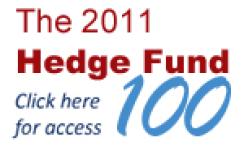
London-based Man sits right behind number two-ranked JPMorgan Asset Management, which in 2010 grew hedge fund assets 20 percent, in large part on the strength of its acquisition several years ago of Highbridge Capital Management, which in turn last October purchased a majority interest in Gávea Investimentos, a Brazilian alternative asset management company with about $6 billion of assets under management.
So, is acquisition the likely route hedge funds will take in the future to become the world’s largest firms? Afterall, the Dodd-Frank financial overhaul bill could provide a new source of acquisition targets since it requires banks to shed their proprietary trading units, which resemble hedge funds.
Experts, however, say don’t bet on these recent developments leading to more deals involving hedge funds. Rather, they say the typical deal will resemble the 2010 merger between TPG-Axon Capital Management (ranked 54), which had $8 billion at the time, and Montrica Investment Management, which had $1.1 billion. Under the deal, no money changed hands and Montrica’s founders, Andrew Metcalfe, Svein Hogset and Fredrik Juntti, agreed to join TPG-Axon.
“A lot of alternative firms and hedge fund firms will do deals,” confirms Eric Weber, Chief Operating Officer and a Managing Director of Freeman & Co., an M&A advisory and consulting firm that specializes in the financial services industry. “The biggest hedge funds will do takeovers, but I’m not sure whether they write a check.”
“I don’t see big merger mania going on in the hedge fund space,” adds Hans Hufschmid, a one-time co-founder of Long-Term Capital Management and currently chief executive officer and a member of GlobeOp, a financial services back-office outsourcing firm that derives about 85 percent of its revenues from hedge funds. “I would be surprised.”
Rather, experts see larger funds growing by “lifting out” specific teams from other firms to expand to a new strategy or “merge” with a firm with perhaps just hundreds of millions of dollars that is saddled with large fixed costs but has little distribution capability and no longer wants to deal with back-office issues or expensive issues like compliance. They will then work out compensation issues that are aligned with the interests of both firms so that the acquired firm or team does not quit on Day Two.
These are very tricky transaction. The buyer wants to back in and pay little or no money for the hedge fund firm or team. The management team may or may not have an economic interest in the fund and is seeking some sort of retention deal and participation in the profits. “Often the seller is not the proprietor,” says John Marra, transaction services – financial services leader, PwC US and one of the primary authors of PwC's recently published papers on M&A in the financial services industry. “There are very few single, clean transactions.”
“If there are two successful hedge funds, I can’t see them merging,” says Hufschmid. He says there is nothing for a firm to gain in a merger or equals.
This does not mean hedge fund firms are not interested in growing assets. Freeman explains that many firms have different teams and products and flavors and will always be looking at adding new flavors. “Virtually all of the top 100 firms are looking at how to grow their business,” he says, although he doubts certain firms like quantitative-driven Bridgewater or Renaissance Technologies would do a lift out or bolt on, whereby a firm grabs a small, fledgling firm of, say, two people.
Other buyers could include private equity funds. For example, BlackRock has managed hedge funds since 1996 and has more than $25 billion invested while Blackstone acquired GSO Capital Partners in 2008. Other private equity funds have bought hedge funds of funds.
Other financial firms also looking to get into the alternative investment business or add to this business include insurance companies, large asset management firms without a presence in alternative investments are looking at hedge fund firms as well as financial firms not impacted by provisions of Dodd-Frank requiring divestiture of prop trading desks.
Last year, for example, SkyBridge Capital purchased the fund of hedge funds, hedge fund seeding and hedge fund advisory businesses from Citi Alternative Investments LLC.
Other potential buyers of hedge funds include foreign firms, particularly in the UK or Europe. For example, Swiss banking giant Credit Suisse is reportedly looking to purchase Rock Creek Group, a fund of hedge funds company run by Afsaneh Beschloss, the former chief investment officer of the World Bank. “Many investors are looking for many different reasons,” says Murra.
Of course, the diciest issue is whether or not investors in the hedge funds choose to remain with a fund after it is acquired or lifted out. This is critical for the deal to make sense. “Investors have to agree to remain,” stresses Kenneth Heinz, President of Hedge Fund Research.
Indeed, Principal Financial Group’s deal in April to purchase a majority interest in London-based Finisterre Capital, LLP underscores how complex these transactions need to be structured in order to be completed. The insurer and asset manager announced that its wholly-owned subsidiary, Principal Global Investors, agreed to acquire a 51 percent majority stake in Finisterre, an emerging markets investor with about $1.63 billion in assets under management primarily across three funds: Global Opportunity Fund, Sovereign Debt Fund and Credit Fund.
It is initially paying $84.6 million for the majority stake, with a possible additional contingent payment of up to $30 million in 2013. Under the deal, the five partners will retain a significant minority stake in the business and have agreed to put a significant share of their consideration into funds managed by the firm. They will continue to direct the day-to-day operations and will retain authority over fund investment decisions.
“Hedge funds are asset light,” says Heinz. “They are built on intellectual property and depend on continued participation. This is different than taking over a paper company.”







